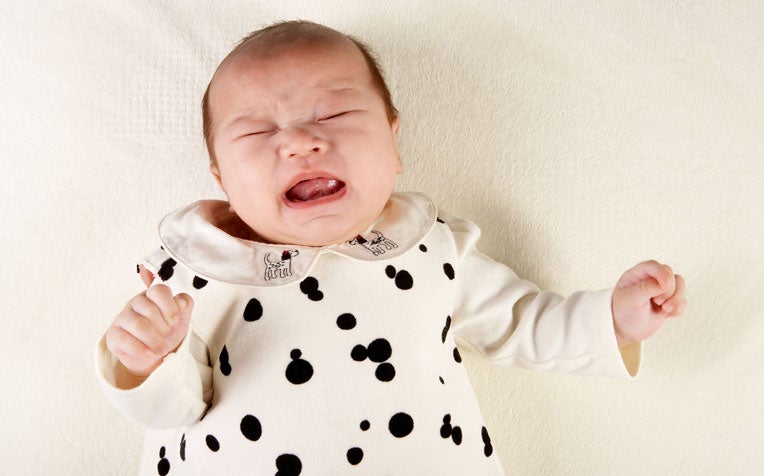
Colic If your baby cries for over 3 hours daily and for over 3 days in a week, it could be colic.
It’s normal for a baby to cry. Healthy babies cry when they have a wet nappy, feel hot or cold, are hungry or tired. And because of differences in temperament, some babies tend to cry more than others.
However, if your baby cries every evening and doesn’t stop crying no matter what you do, it may be because of colic.
What are the symptoms of colic?
Colic is a common condition that is medically diagnosed when an otherwise healthy and well-fed baby displays the following symptoms:
- Cries for more than 3 hours a day, more than 3 days in a week, for over 3 weeks
- Episodes of irritability, fussing or crying beginning and ending for no apparent reason may be diagnosed as colic as early as the first week in cases where no alternative condition is identified*
- The crying is intense and inconsolable – mothers of babies with colic describe the crying as more urgent, discomforting, arousing, and irritating than usual
- Sometimes clenches the fists and pulls up the legs to the stomach while crying
- The stomach may be distended with gas
These symptoms are not exclusive to colic and in fact may point to other medical conditions. Therefore it is important to rule out serious illness before diagnosing colic.
Colic usually starts when the baby is 3 weeks old and peaks around 6 to 8 weeks. The colicky baby often gets better by the age of 3 months.
Colic affects about 10-30 per cent of babies worldwide.
“Infantile colic is known as inconsolable crying and is often accompanied by the drawing up of the legs and gaseous distension of the abdomen. It may occur round the clock but commonly occurs at a predictable time in the evening, and may last several minutes to hours,” says Dr Alison Snodgrass, Consultant, General Paediatrics and Adolescent Medicine Service, KK Women's and Children's Hospital (KKH), a member of the SingHealth group.
Diagnosing a colicky baby
While colic is a common condition, it is necessary to exclude any serious underlying illness and other causes of excessive crying before diagnosing colic in a newborn baby. These other causes of excessive crying include:
- Having hair in the eye
- Strangulated hernia
- Intussusception – an intestinal problem in which one section of the intestine slides into the other section
- Infections such as meningitis and otitis media
If the baby is growing normally, feeding well, sucking and swallowing with gusto and not experiencing any vomiting and diarrhoea, then colic is likely to be diagnosed.
Laboratory studies are usually not carried out for the diagnosis of colic unless the doctor suspects another condition, such as gastroesophageal reflux disease (also known as GERD). “Stool tests to investigate for malabsorption, lactose intolerance or cows’ milk protein allergy may be indicated,” says Dr Snodgrass.
What causes colic?
Colic is a poorly understood condition and its exact cause is unknown. It can occur in both breast-fed and formula-fed babies and is equally common in boys and girls. The following are some possible causes of colic:
- Gastrointestinal causes: These include gastroesophageal reflux disease, over or under feeding, cows’ milk protein allergy, introduction of solids too early.
- Incomplete or no burping after feeding
- Exposure to cigarette smoke
- Food allergy
- Low birth weight
- Different patterns of early intestinal microflora or bacteria. “Lower counts of intestinal bacteria have been observed in colicky infants compared with non-colicky infants,” says Dr Snodgrass.
Some factors that may contribute to colic are aerophagia or swallowing too much air while feeding, an excessively big hole in the bottle teat, formula milk, and various foods in the breastfeeding mothers’ diet, adds Dr Snodgrass.
* Rome III criteria, 2006
Read on to learn how to manage and treat colic in your baby.
Ref: N18














 Get it on Google Play
Get it on Google Play